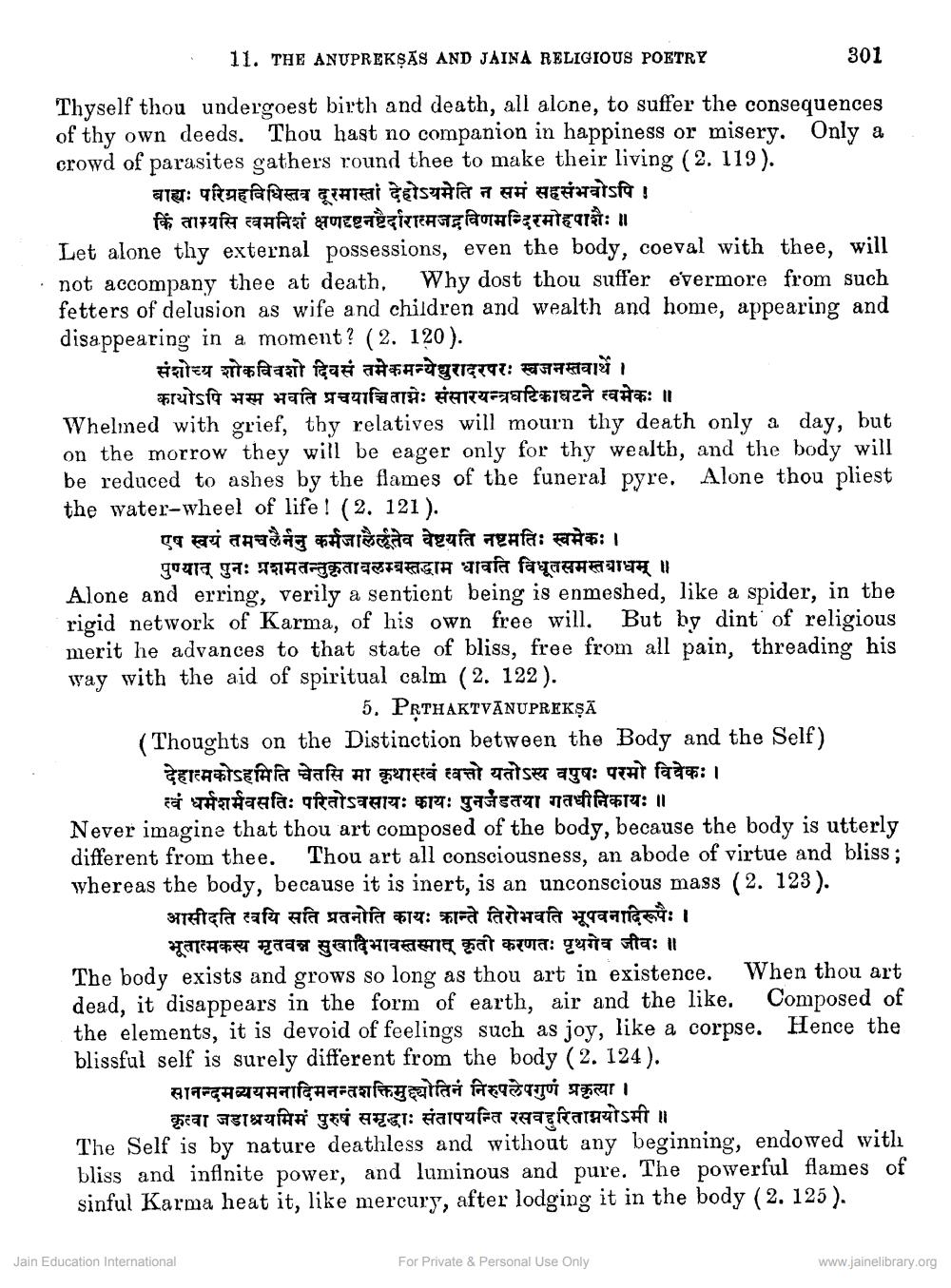________________
11. THE ANUPREKSAS AND JAINA RELIGIOUS POETRY
Thyself thou undergoest birth and death, all alone, to suffer the consequences of thy own deeds. Thou hast no companion in happiness or misery. Only a crowd of parasites gathers round thee to make their living ( 2. 119 ).
बाह्यः परिग्रहविधिस्तव दूरमास्तां देहोऽयमेति न समं सहसंभवोऽपि ! किं ताम्यसि त्वमनिशं क्षणदृष्टनष्टैर्दारात्मजद्रविणमन्दिरमोहपाशैः ॥
Let alone thy external possessions, even the body, coeval with thee, will not accompany thee at death, Why dost thou suffer evermore from such fetters of delusion as wife and children and wealth and home, appearing and disappearing in a moment ? ( 2. 120 ).
संशोच्य शोकविवशो दिवसं तमेकमन्येद्युरादरपरः स्वजनस्तवार्थे ।
कायोsपि भस्म भवति प्रचयाच्चिताग्नेः संसारयन्त्रघटिकाघटने स्वमेकः ॥
Whelmed with grief, thy relatives will mourn thy death only a day, but on the morrow they will be eager only for thy wealth, and the body will be reduced to ashes by the flames of the funeral pyre. Alone thou pliest the water-wheel of life! (2. 121).
एष स्वयं तमचलैर्ननु कर्मजा लेतेव वेष्टयति नष्टमतिः स्वमेकः ।
301
पुण्यात् पुनः प्रशमतन्तुकृतावलम्बस्तद्धाम धावति विधूतसमस्त बाधम् ॥
Alone and erring, verily a sentient being is enmeshed, like a spider, in the rigid network of Karma, of his own free will. But by dint of religious merit he advances to that state of bliss, free from all pain, threading his way with the aid of spiritual calm ( 2. 122 ).
5. PṚTHAKTVANUPREKṢĀ
(Thoughts on the Distinction between the Body and the Self) tereasana चेतसि मा कृथास्वं त्वत्तो यतोऽस्य वपुषः परमो विवेकः । त्वं धर्मशर्मवसतिः परितोऽवसायः कायः पुनर्जडतया गतधीनिकायः ॥
Never imagine that thou art composed of the body, because the body is utterly different from thee. Thou art all consciousness, an abode of virtue and bliss; whereas the body, because it is inert, is an unconscious mass ( 2. 123 ).
आसीदति त्वयि सति प्रतनोति कायः क्रान्ते तिरोभवति भूपवनादिरूपैः । भूतात्मकस्य मृतवन्न सुखादिभावस्तस्मात् कृती करणतः पृथगेव जीवः ॥
When thou art Composed of
The body exists and grows so long as thou art in existence. dead, it disappears in the form of earth, air and the like. the elements, it is devoid of feelings such as joy, like a corpse. Hence the blissful self is surely different from the body ( 2. 124 ).
सानन्दमव्ययमनादिमनन्तशक्तिमुयोतिनं निरुपलेपगुणं प्रकृत्या |
कृत्वा जडाश्रयमिमं पुरुषं समृद्धाः संतापयन्ति रसवद्दुरिताग्नयोऽमी ॥
The Self is by nature deathless and without any beginning, endowed with bliss and infinite power, and luminous and pure. The powerful flames of sinful Karma heat it, like mercury, after lodging it in the body ( 2.125 ).
Jain Education International
For Private & Personal Use Only
www.jainelibrary.org




